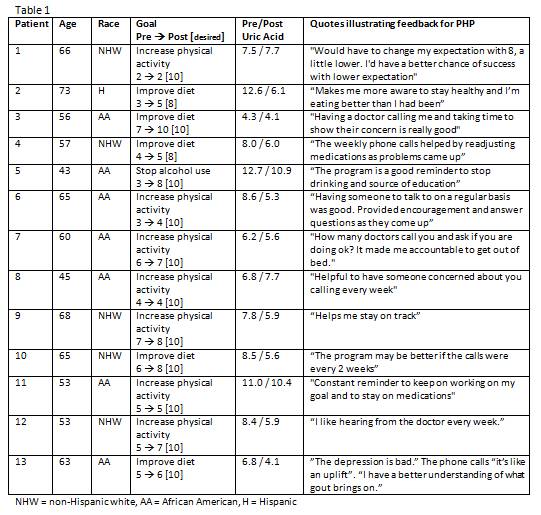Session Information
Title: Health Services Research, Quality Measures and Quality of Care - Innovations in Health Care Delivery
Session Type: Abstract Submissions (ACR)
Background: Gout is a chronic crystal-induced arthritis that predominantly occurs among men with rising prevalence with advancing age. Patients with uncontrolled gout present with recurrent flares leading to unanticipated clinical encounters, i.e. phone calls, ER visits, and/or hospitalization. Given the patient population at the Dallas VAMC, it is appropriate to evaluate novel strategies for improving gout management. Outcomes in gout may be improved by eliciting goals of care from the patient.
The Dallas VA has adapted a personalized health plan (PHP) derived from Duke University’s Integrative Medicine program that assesses patients’ desired goals in 8 different domains, initially tested in diabetic patients. The purpose of this study is to pilot the PHP to facilitate achieving goal uric acid <6mg/dL in patients with uncontrolled gout.
Methods: We recruited consecutive patients at the VA rheumatology clinic with uncontrolled gout, defined by uric acid > 6mg/dL AND ≥ 1 acute gout flare(s) from July to September 2012. This project was reviewed by the VA IRB and considered to be a quality improvement project.
The initial interview focused on formulating a goal (congruent with gout management). Patients selected a goal, indicating their starting and desired status using a numerical scale (1-10). Continuous reinforcement was achieved by weekly phone calls (ALL). Uric acid levels were evaluated at baseline and at the end of the study period. An exit interview was conducted after 3 months; which included open ended questions regarding feedback for the PHP (see Table 1). Clinical encounters over 1 year were evaluated for trends and compared to non-PHP patients using a student’s t-test.
Results: Thirty-six veterans meeting study criteria were approached; 13 agreed to participate and completed the 3 month study. Participants’ average age was 59 ± 8.9 years, 5/13 were Non-Hispanic White, 7/13 African-American and 1/13 Hispanic. All but one selected a goal to increase physical activity or adjust diet. At completion of the study, 1 patient achieved his desired goal; 3/13 remained at the same level; 9/13 did not achieve, but approached, the goal, as seen in Table 1. 10/13 patients had a reduction in uric acid level, of which 8/10 reached the goal of ≤6mg/dL. Clinical encounter data did not significantly differ between PHP participants and non-participants.
Conclusion: This pilot study suggests that Veterans had a positive response to the gout PHP. Veterans indicated satisfaction with physician follow-up phone calls; however, this may not be feasible in a “real world” setting. Future studies evaluating the efficacy of the PHP in gout patients should include a control group, utilize technology for continuous reinforcement, measure unanticipated clinical encounters, and lastly, extend the duration of follow-up to allow behavioral, physical activity, or psychosocial change.
Disclosure:
A. L. Leyva,
None;
U. E. Makris,
None;
S. Kazi,
None.
« Back to 2013 ACR/ARHP Annual Meeting
ACR Meeting Abstracts - https://acrabstracts.org/abstract/implementing-a-personalized-health-plan-to-improve-therapeutic-outcomes-in-veterans-with-gout/

